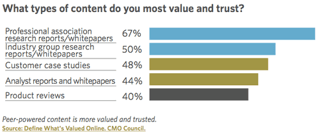

J&C Blog
Find all the latest marketing trends on the J&C Blog.

Find all the latest marketing trends on the J&C Blog.
Content marketing can be a key driver in ensuring that your company’s website ranks better through search engines. Content marketing includes ebooks, downloads, blog articles, checklists, videos and web pages. This is the optimal type of content that will support SEO/keyword analytics. Content development requires specialized techniques to maximize the necessity for quality and quantity. Simple web pages that simply deliver streamlined copy, around 200 to 300 words, don’t qualify as content marketing, and don’t necessarily have a strong positive impact on search engine optimization.
B2B marketers routinely spend about 1/4 of their company budget on creating, delivering and prompting content. HubSpot reports that companies that blog 15 or more times per month get 5x more traffic than companies that don’t blog.
1. Quality and quantity are Google's new buzzwords.
Wasting hours of your valuable time trying to dissect Google's search algorithm is like putting together a 1,000-piece puzzle without realizing some of the pieces have not been created—and you will never finish the puzzle. What is known about Google's new algorithm, however, is that meaty, dynamic content focusing on keyword analytics instead of keyword placement represents the present and future of productive content marketing. For example, blogging frequently is an excellent way to drive traffic to a site since Google rewards dynamic content but soundly dings static, "evergreen" content marketing.
 The graph on the right developed by the Chief Marketing Officer (CMO) Council demonstrates the power of peer-developed content. The study specifically highlights how over half of CMOs value white papers, research reports and case studies.
The graph on the right developed by the Chief Marketing Officer (CMO) Council demonstrates the power of peer-developed content. The study specifically highlights how over half of CMOs value white papers, research reports and case studies.
2. Use a keyword analytics tool.
Keyword analysis is the stepping stone of all successful content marketing campaigns. Using a keyword analytics tool helps marketers develop content optimized to improve web traffic by discovering specific queries that bring visitors to the content via a search.
The chart below was developed by KISSMetrics, and serves as a guide in better understanding the complexity of keyword selection.
Keyword selection isn’t simply a brainstorming process. Certain keywords can be highly competitive and therefore the difficulty in ranking for those keywords is going to be a challenge. The goal of keyword analysis is to find words your company can rank for on search engine result, which will ultimately drive and increase traffic to your company’s website.
3. Role of word count in SEO and ranking.
According to Nielsen Norman Group, short content tends to attract impulse buyers while longer content that offers more information will attract people who desire long-term solutions to their needs.1 In other words, higher word counts mean greater conversion and ROI rates. In addition, Google's new algorithm does not tolerate self-serving, blatantly promotional content that typically screams “keyword stuffing” (loading a web page with keywords in order to manipulate search rankings) and other useless SEO techniques.
4. Blogs work.
Blogging regularly is the best way to facilitate a close relationship with the almighty Google search engine. Because Google is the top search portal in the world, owns the leading keyword analytic tools and has the biggest ad distribution network, bloggers who keep their content fresh and optimized will be rewarded. Fresh, constant flow of content is something Google values and will directly impact ranking of words. In fact, Google loves blogs so much that it has launched its own search portal specifically for blog queries.
5. Inbound links can be driven by good quality content.
Successful SEO content marketing requires the use of effective inbound linking techniques that send top-quality traffic to your website. When your site receives traffic directed from premium sites, your page inevitably experiences boosts in rank, which prevents your site from suffering a premature burial in Google's graveyard of unworthy websites. Building great content improves your chances of being linked to by other sites. A successful content marketing strategy can increase links to your site 5- to 10 fold, if not more.
Content marketers know how to use inbound links so that Google's algorithm accepts the links as legitimate and meaningful. Content marketers strategically integrate inbound links into blogs, articles, ebooks, email campaigns and other content types necessary for the development of long-term strategies.
The bottom line is that SEO is definitely impacted by content marketing. Content marketing provides the irresistible fare that search engines love to eat. Content marketers can provide relevant, fresh and frequent food to these search engines so that sites rank better, develop an impeccable reputation with search engines and drive traffic through solid inbound links. To evaluate if your content marketing strategy is up to par, sign up for our personalized content marketing assessment.
Source:
1. http://www.nngroup.com/articles/content-strategy-long-vs-short
Topics: Content Marketing
303 E Wacker Drive, Suite 2030
Chicago, IL 60601
Phone: 312-894-3000
Fax: 312-894-3005